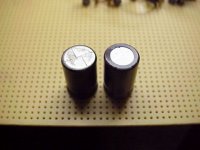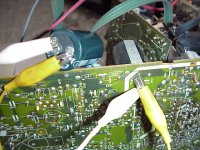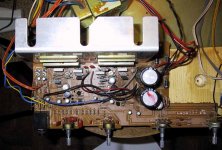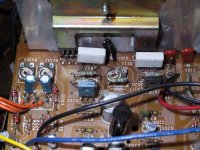I measured the current at the power resistor and it was 100mA.
I lowered it to 30mA and now the sink don't burn anymore.(thanks, Jan 😉)
But the hum didn't totaly disapeared and still is larger on one channel that the other.
I also noticed that on turn on, when heating up, the noise was much bigger, and then lowered.
Could it be possible to be a potenciometer problem? (just guessing)
I lowered it to 30mA and now the sink don't burn anymore.(thanks, Jan 😉)
But the hum didn't totaly disapeared and still is larger on one channel that the other.
I also noticed that on turn on, when heating up, the noise was much bigger, and then lowered.
Could it be possible to be a potenciometer problem? (just guessing)
Hi PedroPo
As you tell us that the hum is louder at startup, i'm almost sure it's one or more caps (electrolytic). Usually, when worn-out caps are cold they have almost no capacity anymore. When they warm up the capacity comes back a little and the hum disappears a bit.
Here a pic (left) from a bad cap(heat) and (right) a new one😱
Hugo
As you tell us that the hum is louder at startup, i'm almost sure it's one or more caps (electrolytic). Usually, when worn-out caps are cold they have almost no capacity anymore. When they warm up the capacity comes back a little and the hum disappears a bit.
Here a pic (left) from a bad cap(heat) and (right) a new one😱
Hugo
Attachments
Thanks Hugo.
Do you think I should replace the PSU big caps or the little ones on the amp board?
Do you think I should replace the PSU big caps or the little ones on the amp board?
Caps
On the PSU caps, if you have similar caps lying around, you can always try to parallel one and listen to the difference. See pic. But be careful, these are the main rails. As i recall, look for worn-out caps like the one on the picture in previous post. They can be tricky. If you have a cap-meter, things are easier, take them out and measure them. (discharge them big ones before measuring!)If you have a scope you can measure the ripple, but i wouldn’t by a scope just for that😉
Finding bad caps is something i learned over the years with looking around carefully on the board. Sometimes, when i look at a chassis, i can tell in 2 minutes wich caps should be changed, and if i do so the thing is fixed. But it takes years...and it's my job
🙂
On the PSU caps, if you have similar caps lying around, you can always try to parallel one and listen to the difference. See pic. But be careful, these are the main rails. As i recall, look for worn-out caps like the one on the picture in previous post. They can be tricky. If you have a cap-meter, things are easier, take them out and measure them. (discharge them big ones before measuring!)If you have a scope you can measure the ripple, but i wouldn’t by a scope just for that😉
Finding bad caps is something i learned over the years with looking around carefully on the board. Sometimes, when i look at a chassis, i can tell in 2 minutes wich caps should be changed, and if i do so the thing is fixed. But it takes years...and it's my job
🙂
Attachments
Sony
Netlist,
Since you apparently know what you are talking about, in your experience, is it possible that electrolytics when they get older start to leak, I mean have a low resistance to DC? Or is it that the capacity goes down?
Jan Didden
Netlist,
Since you apparently know what you are talking about, in your experience, is it possible that electrolytics when they get older start to leak, I mean have a low resistance to DC? Or is it that the capacity goes down?
Jan Didden
Caps
janneman
They start to leak, lose their capacitance, have lower DC resistance, name it... A lot depends on the quality of the caps, the heat and the application. In switching PSU's they tend to die faster. When tey are placed near heat sinks also. Whoooo….those Alephs run hot………
😉
janneman
They start to leak, lose their capacitance, have lower DC resistance, name it... A lot depends on the quality of the caps, the heat and the application. In switching PSU's they tend to die faster. When tey are placed near heat sinks also. Whoooo….those Alephs run hot………
😉

In the workshop we check that with a hairdryer and coldspray.As you tell us that the hum is louder at startup, i'm almost sure it's one or more caps (electrolytic). Usually, when worn-out caps are cold they have almost no capacity anymore. When they warm up the capacity comes back a little and the hum disappears a bit.
Especially when you have got loads of caps (in a TV-tuner for example) and don´t know which is the bad dude.
Of course you have to do it carefully and not heat up critical components.
BUT even if this test fails the capacity might be so low that it won´t help to heat it a little.
Jens
now that you mention it, when I blow the dust off the board, I hear a interference in the sound !!!
Caps
Correct! But over the years one gets some special feeling for bad caps...
PedroPo
Time to heat that soldering iron!!!
joensd said:
In the workshop we check that with a hairdryer and coldspray.
Especially when you have got loads of caps (in a TV-tuner for example) and don´t know which is the bad dude.
Of course you have to do it carefully and not heat up critical components.
BUT even if this test fails the capacity might be so low that it won´t help to heat it a little.
Jens
Correct! But over the years one gets some special feeling for bad caps...
PedroPo
Time to heat that soldering iron!!!
Yesss. And put in jolly big ones!I'm going to pull those bastards off right now!!!

No seriously. For a class AB amp it won´t hurt to upgrade a little and for example use 10000uF instead of 6800uF.
But then you shouldn´t take the real cheap ones.
Sony usually uses the audio series of black Elna´s.
If the amplifier is worth it...😕
Cheers
Jens
the only big cans I have at home are panasonics 150 000uF !!!
I will not use them, but I'll test it anyway.
As for normal size caps, I only have 1000uF for their voltage (35V)
could they do the trick?
I will not use them, but I'll test it anyway.
As for normal size caps, I only have 1000uF for their voltage (35V)
could they do the trick?
A bit higher in value is ok, but don't replace the 220µF with 150.000µF. You woudnt have the place for it anyway
By the way, you have some pics?🙂

By the way, you have some pics?🙂
No Cro Needed....
Pedro,
You can measure ripple on the DC rails with your DMM set to ACV.
Compare the two rails - if there is a big difference that may be your problem, but more likely the hum is due to dried smaller caps.
"But the hum didn't totaly disapeared and still is larger on one channel that the other.
I also noticed that on turn on, when heating up, the noise was much bigger, and then lowered.
Could it be possible to be a potenciometer problem? (just guessing)"
How bad is the hum ?.
I reckon that you should replace all the smaller caps on the amp pcb with new ones, preferrably low ESR SMPS ones.
Blanket resoldereing is strongly advised on this age of board.
Also look for contact glue - this ages, goes dark in colour and becomes conductive - bad news.
Eric.
Pedro,
You can measure ripple on the DC rails with your DMM set to ACV.
Compare the two rails - if there is a big difference that may be your problem, but more likely the hum is due to dried smaller caps.
"But the hum didn't totaly disapeared and still is larger on one channel that the other.
I also noticed that on turn on, when heating up, the noise was much bigger, and then lowered.
Could it be possible to be a potenciometer problem? (just guessing)"
How bad is the hum ?.
I reckon that you should replace all the smaller caps on the amp pcb with new ones, preferrably low ESR SMPS ones.
Blanket resoldereing is strongly advised on this age of board.
Also look for contact glue - this ages, goes dark in colour and becomes conductive - bad news.
Eric.
- Status
- Not open for further replies.
- Home
- Amplifiers
- Solid State
- Help on sony Amplifier




